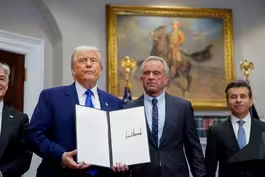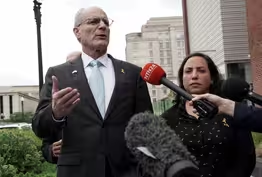
Trump's bill clears House, faces uncertain future in Senate
Clip: 5/22/2025 | 6m 29sVideo has Closed Captions
House GOP passes Trump's 'big, beautiful bill,' but it faces uncertain future in Senate
By the narrowest of margins, Republicans in the House passed President Trump's legislative wish list, setting up a future standoff with the Senate. Congressional correspondent Lisa Desjardins tracked the shifting politics and policy throughout the night.
Problems playing video? | Closed Captioning Feedback
Problems playing video? | Closed Captioning Feedback
Major corporate funding for the PBS News Hour is provided by BDO, BNSF, Consumer Cellular, American Cruise Lines, and Raymond James. Funding for the PBS NewsHour Weekend is provided by...

Trump's bill clears House, faces uncertain future in Senate
Clip: 5/22/2025 | 6m 29sVideo has Closed Captions
By the narrowest of margins, Republicans in the House passed President Trump's legislative wish list, setting up a future standoff with the Senate. Congressional correspondent Lisa Desjardins tracked the shifting politics and policy throughout the night.
Problems playing video? | Closed Captioning Feedback
How to Watch PBS News Hour
PBS News Hour is available to stream on pbs.org and the free PBS App, available on iPhone, Apple TV, Android TV, Android smartphones, Amazon Fire TV, Amazon Fire Tablet, Roku, Samsung Smart TV, and Vizio.
Providing Support for PBS.org
Learn Moreabout PBS online sponsorshipGEOFF BENNETT: By the narrowest of margins, Republicans in the House passed the president's legislative wish list early this morning, setting up a future standoff with the Senate.
Congressional correspondent Lisa Desjardins tracked the shifting politics and policy throughout the night.
LISA DESJARDINS: Before most of the country was awake, a big, close vote.
REP. MIKE JOHNSON (R-LA): On this vote, the yeas are 215, the nays are 214, with one answering present.
The bill is passed.
LISA DESJARDINS: With cheers of "USA," House Republicans passed their sweeping version of the president's agenda, the one big, beautiful bill, as Trump dubbed it.
REP. MIKE JOHNSON: Today, the House has passed generational, truly nation-shaping legislation.
LISA DESJARDINS: And it is big, more than 1,000 pages.
It extends and expands trillions of dollars in tax breaks, spends hundreds of billions on border security and defense.
At the same time, it attacks spending elsewhere, eliminating green energy tax incentives, adding new Medicaid requirements, and cutting SNAP, or food stamp, funding to states.
REP. JIM MCGOVERN (D-MA): We live in the richest country on Earth, for God's sake, and not a single kid in this country should go to bed hungry.
LISA DESJARDINS: In overnight debate, Democrats and Republicans sparred over whether the bill makes overdue reforms or if it harms people in need.
REP. ERIN HOUCHIN (R-IN): The bill requires states to have skin in the game on SNAP.
The bill requires states to be more responsible about how Medicaid is funded.
The bill provides needed tax relief for seniors.
REP. JIM MCGOVERN: Enough with the B.S.
about states having skin in the game.
This is about throwing families off of food assistance.
And it's an awful thing to do.
LISA DESJARDINS: Fights within the Republican majority nearly derailed this House version.
REP. NICK LALOTA (R-NY): We should come to a deal that helps my middle-class constituents be made a little more whole.
LISA DESJARDINS: Blue state moderates demanded and in the last day got more relief in places with heavy state and local taxes.
And fiscal hawks negotiated an earlier start to some spending cuts.
REP. CLAY HIGGINS (R-LA): It was always my intention, our intention to get to a yes.
We were just pushing the bill as deep into the conservative spectrum as we could.
LISA DESJARDINS: But the linchpin was President Trump himself, speaking with Republicans Tuesday morning at the Capitol and then yesterday with holdouts at the White House.
All the while, Republicans in the House held two overnight sessions with a 20-hour committee hearing, testing lawmakers' eyelids earlier this week, and then last night's all-nighter testing GOP holdouts.
In the end, Speaker Johnson eked out his biggest victory yet, winning by a single vote, though the dark of night cost him one member who would have voted yes, overslept and missed it.
GEOFF BENNETT: And Lisa joins us now to break down what's included in the bill.
OK, Lisa, so let's talk about who would be affected and how.
LISA DESJARDINS: This is one of the largest bills in recent history, and we're going to talk a lot about it in coming weeks and months, but tonight, I want to focus on the groups affected.
And the largest one is a large group, taxpayers.
So let's talk about what's in here in general.
The biggest portion of this is, it would lock in current tax rates, which are the 2017 Trump tax cuts, and it essentially would avoid tax hikes of somewhere between 3 percent to 50 percent between your group.
That affects millions, 122 million tax returns in this country.
So that's a big one, and also we know there are temporary tax cuts in this bill for tips over time, new deduction for seniors, some new things for people with kids.
All of that is in here.
Now, taxpayers will keep $4 trillion because of those tax cuts if they go through, but that's revenue that the government has lost.
To make up for that, there are some major changes in health care.
So let's look at that, Medicaid high on the list.
That's where we will see new work requirements if this is passed for able-bodied Americans.
This would also block some Obamacare subsidies.
Altogether, those health care changes would mean some 13 million Americans would no longer have health insurance.
That's according to the Congressional Budget Office.
We will continue to get estimates, but this is the trade-off that this bill would make.
GEOFF BENNETT: What about immigration, which is another major part of this legislation?
LISA DESJARDINS: Right.
Literally in the center of the bill is the immigration and border portion, and it really caught my attention when I looked at it.
So in there, here we have $150 billion for border enforcement and detention.
Also something I didn't know that was added in the last day, $12 billion to repay states that have going back to the Biden administration enforce the border on their own.
Texas, I think, is what we're talking about there.
There's also $1.3 billion for the Department of Homeland Security to hire attorneys to represent it, not to represent migrants, but to represent it in court as it tries to get more removed.
That's a lot of money.
And there are many more fees in here for migrants, including a $5,000 fee for someone who wants to sponsor an unaccompanied minor, someone who might be trying to find a place to stay in America, $5,000 you need to put up front, a new fee for asylum, all kinds of new fees for migrants in here.
GEOFF BENNETT: You have finished reading this bill.
You also tracked the changes from last night.
What stands out to you?
LISA DESJARDINS: Small correction.
Almost finished.
I'm on page 800.
I'm very close.
GEOFF BENNETT: Almost.
I won't hold it against you.
LISA DESJARDINS: I'm close.
So, one big one, student loans.
I was really surprised at this section of the bill.
People need to understand here there would be no more subsidized student loans from the federal government.
It would cap undergraduate federal loans at $50,000 per student.
And it would limit repayment plans in a very significant way that could raise how much anyone in those loans would have to pay.
And for those on Pell Grants, it would require more classes, more credits in order to qualify for those, so significant changes there.
One other thing, this would also change how silencers work.
No longer -- for guns, no longer would you require to register a silencer.
And the fee, the tax on silencers would go to zero.
That was something Freedom Caucus members got in the last minute.
GEOFF BENNETT: Lisa Desjardins, you have been up for the last 36 hours covering all of this.
Our thanks to you and the team.
LISA DESJARDINS: You're welcome.
Georgetown scholar speaks for first time since ICE detention
Video has Closed Captions
Clip: 5/22/2025 | 9m 33s | Georgetown scholar and wife speak out for first time since his ICE detention (9m 33s)
Israeli embassy killings investigated as terrorism
Video has Closed Captions
Clip: 5/22/2025 | 3m 34s | Israeli embassy worker killings investigated as hate crime and terrorism (3m 34s)
‘MAHA’ report targets vaccines, food and prescription drugs
Video has Closed Captions
Clip: 5/22/2025 | 8m 49s | Kennedy's ‘MAHA’ report targets vaccines, food supply and prescription drugs (8m 49s)
'Stop delegitimizing us,' Israeli ambassador to U.S. says
Video has Closed Captions
Clip: 5/22/2025 | 7m 11s | 'Stop delegitimizing us,' Israeli ambassador to U.S. says after embassy worker killings (7m 11s)
Tapper and Thompson discuss book on Biden's signs of decline
Video has Closed Captions
Clip: 5/22/2025 | 9m 54s | Tapper and Thompson discuss book claiming Biden's inner circle hid signs of decline (9m 54s)
Providing Support for PBS.org
Learn Moreabout PBS online sponsorship
- News and Public Affairs

FRONTLINE is investigative journalism that questions, explains and changes our world.

- News and Public Affairs

Amanpour and Company features conversations with leaders and decision makers.












Support for PBS provided by:
Major corporate funding for the PBS News Hour is provided by BDO, BNSF, Consumer Cellular, American Cruise Lines, and Raymond James. Funding for the PBS NewsHour Weekend is provided by...




